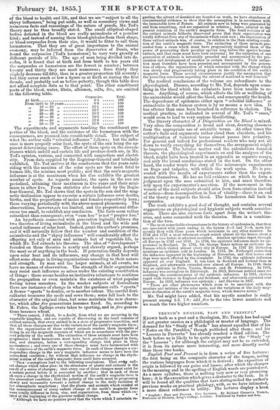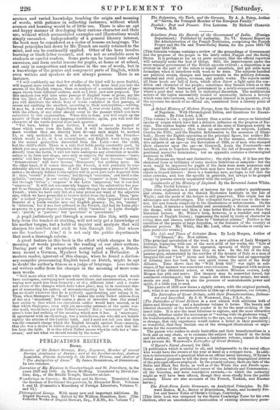TRENCH'S ENGLISH, PAST AND PRESENT. *
EN owl.; both as a poet and a theologian, Mr. Trench has had equal if not greater success as a philologist or master of language. The demand for his "Study of Words" has almost equalled that of his "Notes on the Parables," though published after them ; and his " Lessons in Proverbs " has already reached a third edition. The book before us is likely to be quite as popular as the " Study " or the " Lessons "; for although the subject may not be so extended, it is from its nature more interesting, and more directly useful than those two books.
English Past and Present is in form a series of five lectures : the first being on the composite character of the tongue, noting the various languages from which it is derived ; the exposition of origin is followed by our gains and losses; after which the changes in the meaning and in the spelling of English words are pointed out. As a mere syllabus, there is nothing very new or very promising here ; it is the execution which gives a character to the book. In it will be found all the qualities that have distinguished the author's previous works on practical philology, with, as we have intimated, a more direct reference to utility. The lectures display a keen • Englishand Present- Fire Lectures. By Richard Chenevin. Trench, Professor of Divinity, King's College, London. Published by Parker and Son. seamen and varied knowledge touching the origin and meaning of words, with patience in collecting instances, without which acumen and learning would be of little use. There is also an at and happy manner of developing their curious character and their use, without which accumulated examples and illustrations would simply encumber. Independently of a general literary interest, the book may be considered as a series of lessons on language. The broad principles laid down by Mr. Trench are easily retained in the mind, and can be continually applied. Other of the laws involve learning or black-letter research, and are not so available save to students or careful readers. Some parts can be turned into school exercises, and form useful lessons for pupils, at home or at school, not only in composition and readiness in the use of words, but in a knowledge of the genius and component parts of English, which even writers and speakers do not always possess. Here is an instance.
"I will confidently say that few studies of the kind will be more fruitful, will suggest more various matter of reflection, will more lead you into the secrets of the English tongue, than an analysis of a certain number of pas- sages drawn from different authors, such as I have ,just now proposed. For this analysis you will take some passage of English verse or prose, say the first ten lines of Paradise Lost—or the Lord's Prayer—or the 23d Psalm ; you will distribute the whole body of words contained in that passage, of course not omitting the smallest, according to their nationalities,—writing, it may be, A over every Anglo-Saxon word, L over every Latin, and so on with the others, if any other should occur in the passage which you have submitted to this examination. When this is done, you will count up the number of those which each language contributes; again, you will note the character of the words derived from each quarter. "Yet here, before I pass further, I would observe in respect of those which come from the Latin, that it will be desirable further to mark whether they are directly from it—and such might be marked Li, or only mediately from it, and to us directly from the French— which would be L2, or L at second-hand; our English word being only in the second generation descended from the Latin —not the child, but the child's child. There is a rule that holds pretty constantly good, by which you may generally determine this point. It is this—that if a word be directly from the Latin, it will not have undergone any alteration or modifi- cation in ite form and shape, save only as respects the termination—'inno- oentia' will have become ' innocency," natio ' will have become nation,' • firmamentum' will have become firmament,' but nothing more. On the other hand, if it comes through the French, it will generally be con- siderably altered in its passage. It will have undergone a process of lubri- cation; its sharply defined Latin outline will in good part have departed from it : thus, 'crown' is from 'corona,' but through 'couronne,' and itself a dis- syllable, coroune,' in our earlier English; 'treasure' is from 'thesaurus,' but through tresor ' ; emperor' is the Latin 'imperator,' but it was first ' empereur.' It will not uncommonly happen that the substantive has pas- sed to us through this process, having come through the intervention of the French , while we have only felt at a later period our want of the adjective also, which we have proceeded to borrow direct from the Latin. Thus, peo- ple ' is indeed populus,' but it was peuple ' first, while 'popular' is a direct transfer of a Latin vocable into our English glossary. So, too, 'enemy' is • inimical,' but it was first softened in the French, and had its Latin phy- siognomy to a great degree obliterated, while inimical' is Latin through- out ; 'parish,' is paroisse,' but parochial' is 'parochialis! "
A pupil judiciously put through a course like this, with some help from the teacher at starting, will not only get a knowledge of his mother tongue, but a habit of inquiry and analysis that will sharpen his intellect and stick to him through life. But where are the teachers ? Alas ! it is not only the public departments that need a thorough reform. A great feature in this book is the effect which changes in the meaning of words produce in the reading of our older authors. During part of the seventeenth century and earlier, a Dutch- man meant a German, Mynheer being called a Hollander. A modern reader, ignorant of this change, when he found a diction- ary-compiler pronouncing English based on Dutch, might be apt to doubt the author'e, fitness as a judge of language. Less techni- cal writers suffer from the changes in the meaning of more com- mon words.
" Still more often will it happen with the subtler changes which words have undergone, conveying now much more blame and condemnation, or con- veying now much less than formerly ; or of a different kind : and a reader not aware of the changes which have taken place, may be in continual dan- ger of misreading his author, of misunderstanding his intention, while he has no doubt whatever that he is perfectly apprehending and taking it in. Thus, when Shakspere in Henry VI.' makes the noble Talbot address Joan of Aro as a miscreant,' how coarse a piece of invective does this sound! how unlike to that which the chivalrous soldier would have uttered, or to that which Shakspere, even with his unworthy estimate of the noble war- rior maid, would have put into Talbot's mouth ! But a miscreant' in Shak- spore's time had nothing of the meaning which now it has. A miscreant,' in agreement with its etymology, was a misbeliever, one who did not believe rightly the articles of the Catholic faith. And I need not tell you that this was the constant charge which the English brought against Joan—namely, that she was a dealer in hidden magical arts, a witch, and as such had fal- len from the faith. It is this which Talbot means when he calls her a' mis- creant,' and not what we should intend by the name."



































 Previous page
Previous page